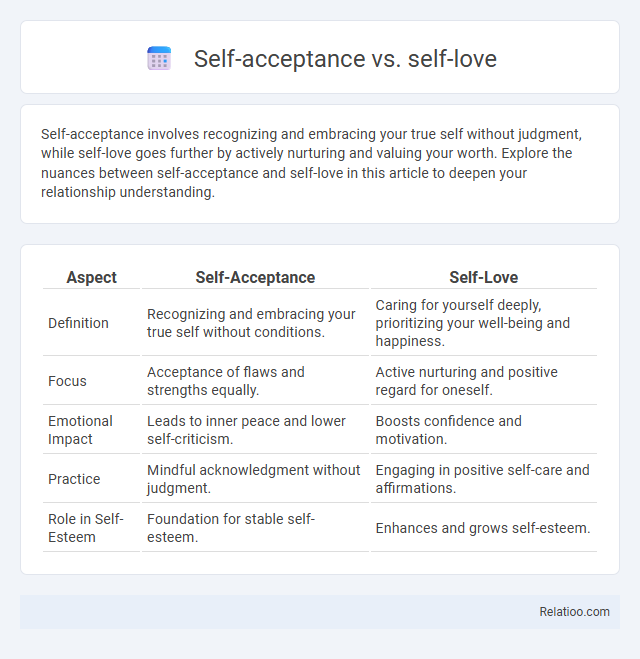Self-acceptance involves recognizing and embracing your true self without judgment, while self-love goes further by actively nurturing and valuing your worth. Explore the nuances between self-acceptance and self-love in this article to deepen your relationship understanding.
Table of Comparison
| Aspect | Self-Acceptance | Self-Love |
|---|---|---|
| Definition | Recognizing and embracing your true self without conditions. | Caring for yourself deeply, prioritizing your well-being and happiness. |
| Focus | Acceptance of flaws and strengths equally. | Active nurturing and positive regard for oneself. |
| Emotional Impact | Leads to inner peace and lower self-criticism. | Boosts confidence and motivation. |
| Practice | Mindful acknowledgment without judgment. | Engaging in positive self-care and affirmations. |
| Role in Self-Esteem | Foundation for stable self-esteem. | Enhances and grows self-esteem. |
Understanding Self-Acceptance: Definition and Importance
Self-acceptance involves recognizing and embracing all aspects of oneself, including strengths and weaknesses, without judgment or denial. This foundational concept fosters emotional resilience and reduces internal conflicts, promoting mental well-being and personal growth. Understanding self-acceptance as an ongoing process is crucial for developing a healthy relationship with oneself, which differentiates it from self-love's emphasis on nurturing and valuing oneself.
What is Self-Love? Core Concepts Explored
Self-love involves embracing your worth and nurturing your well-being through practices that promote positive self-regard and emotional health. It encompasses self-acceptance, which is recognizing your flaws and strengths without judgment, but extends further to actively caring for your needs and setting healthy boundaries. Understanding self-love helps you build resilience, improve relationships, and foster a deeper connection with yourself.
Key Differences Between Self-Acceptance and Self-Love
Self-acceptance involves recognizing and embracing all aspects of oneself, including flaws and imperfections, without judgment. Self-love goes beyond acceptance by fostering a deep sense of care, compassion, and nurturing towards oneself, promoting ongoing personal growth and well-being. The key difference lies in self-acceptance being a foundational acknowledgment, while self-love involves actively cultivating kindness and positive actions toward oneself.
The Psychology Behind Self-Acceptance
The psychology behind self-acceptance involves recognizing and embracing all aspects of oneself without judgment, fostering emotional resilience and reducing internal conflict. Self-acceptance serves as a foundation for mental well-being by allowing individuals to acknowledge flaws and strengths alike, leading to increased self-awareness and reduced anxiety. Unlike self-love, which emphasizes nurturing and positive regard, self-acceptance centers on a realistic, non-evaluative acknowledgment of one's true self.
How Self-Love Shapes Our Daily Lives
Self-love profoundly influences daily life by enhancing emotional resilience, promoting healthy boundaries, and fostering a positive self-image that encourages personal growth. Unlike self-acceptance, which involves acknowledging one's flaws without judgment, self-love actively nurtures kindness and compassion toward oneself, leading to improved mental health and relationships. The practice of self-love integrates self-acceptance and self-esteem, creating a holistic foundation for well-being and life satisfaction.
Common Myths about Self-Acceptance and Self-Love
Common myths about self-acceptance and self-love often confuse the two, mistakenly believing self-acceptance means complacency or lack of growth, while self-love is sometimes seen as narcissism. In reality, self-acceptance involves embracing your flaws and strengths without judgment, forming the foundation for genuine self-love, which cultivates care and respect for your well-being. Recognizing these distinctions helps Your personal development by debunking misconceptions and fostering a healthier relationship with yourself.
Barriers to Achieving Self-Acceptance and Self-Love
Barriers to achieving self-acceptance and self-love often include deep-seated negative self-beliefs, societal pressures, and fear of vulnerability. Internalized criticism and unrealistic expectations can hinder embracing one's true self, while external judgment reinforces feelings of inadequacy. Overcoming these obstacles requires cultivating self-compassion, resilience, and challenging distorted cognitive patterns to foster genuine self-worth.
Practical Ways to Cultivate Self-Acceptance
Practical ways to cultivate self-acceptance involve embracing personal flaws and celebrating unique strengths without judgment, fostering a balanced self-view. Techniques such as mindful self-reflection, daily affirmations, and setting realistic personal goals support emotional resilience and reduce negative self-talk. Engaging in supportive social connections and seeking professional guidance can further deepen self-acceptance and promote sustained mental well-being.
Effective Practices to Foster Self-Love
Effective practices to foster self-love include daily affirmations that reinforce your inherent worth and recognizing your personal achievements, no matter how small. Engaging in mindful self-care routines, such as meditation, journaling, or physical activity, nurtures both your mental and physical well-being. Prioritizing boundaries and compassion towards yourself helps distinguish self-love from self-acceptance, empowering you to cultivate a healthier, more positive relationship with your inner self.
Integrating Self-Acceptance and Self-Love for Personal Growth
Integrating self-acceptance and self-love fosters profound personal growth by acknowledging one's flaws without judgment while actively nurturing one's well-being and worth. Self-acceptance involves embracing all aspects of the self, including imperfections, whereas self-love encompasses practices that promote care, respect, and positive affirmations towards oneself. Cultivating both concepts creates a balanced foundation for resilience, emotional health, and authentic self-improvement.

Infographic: Self-acceptance vs Self-love
 relatioo.com
relatioo.com